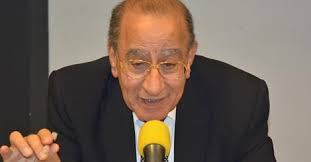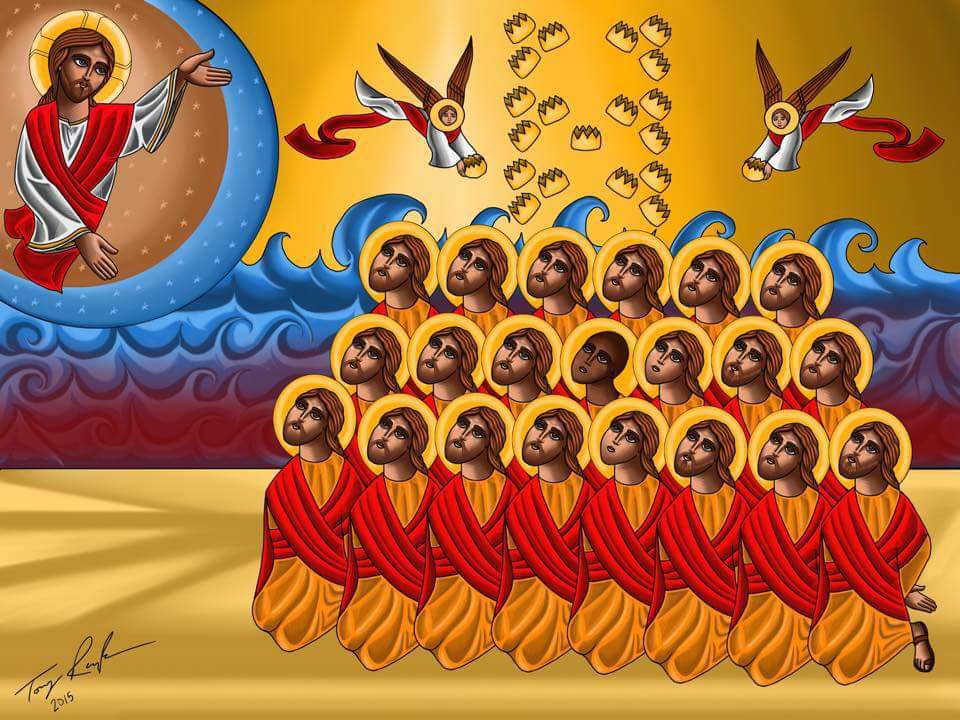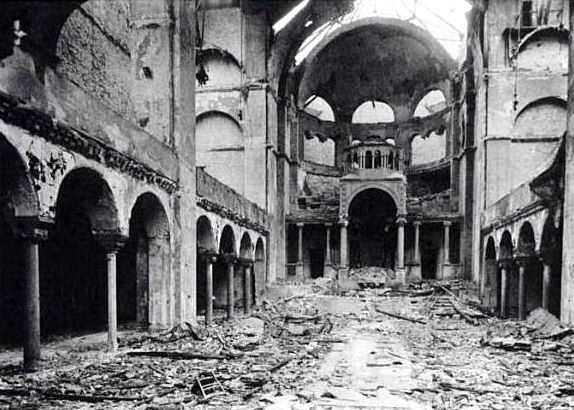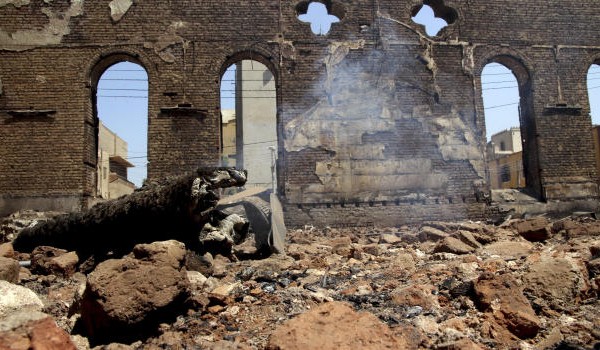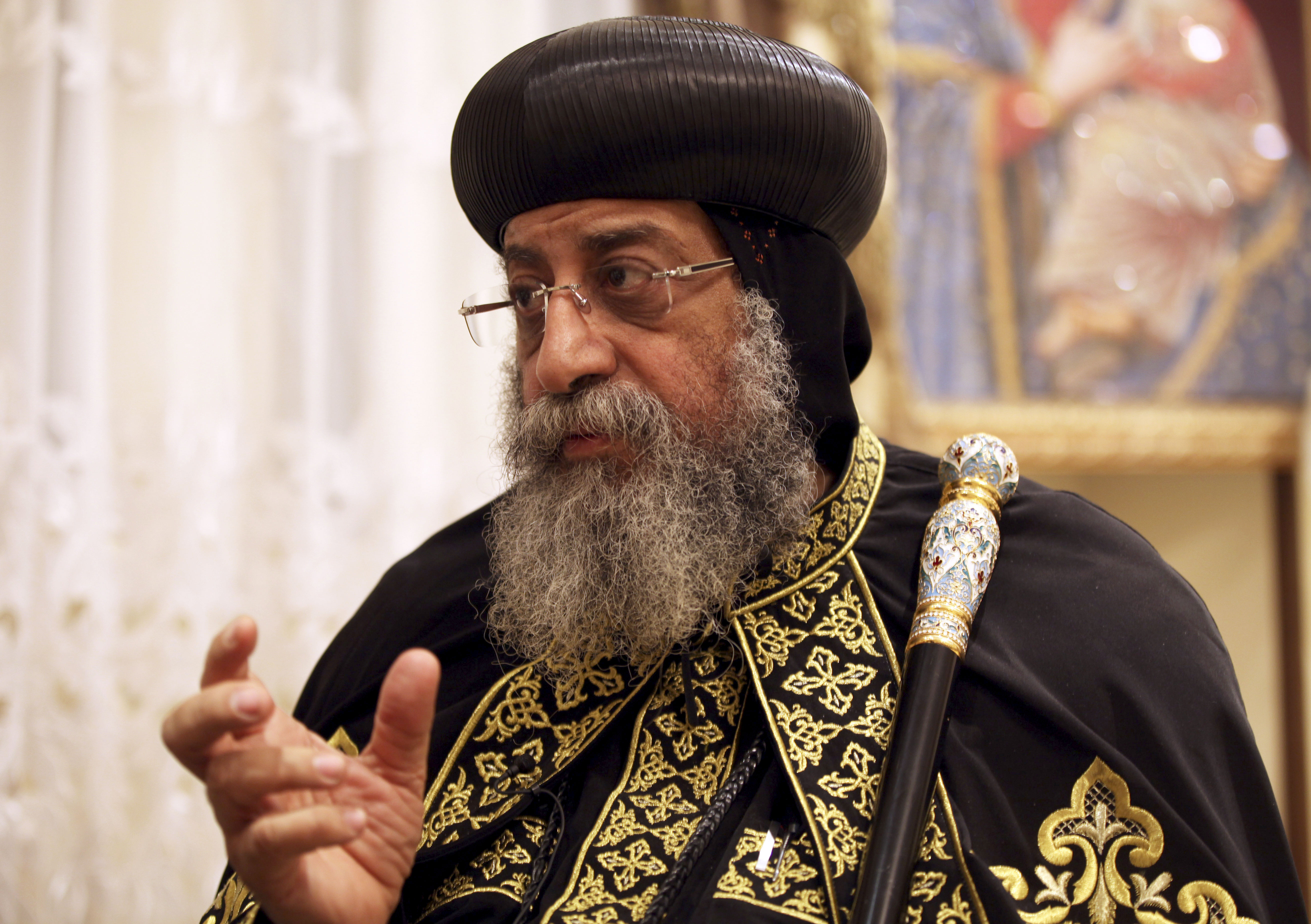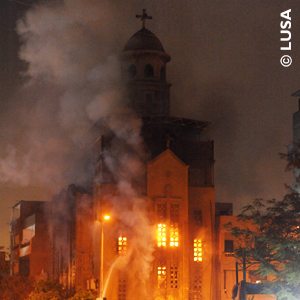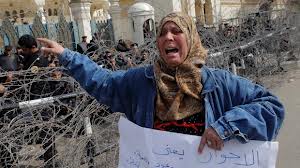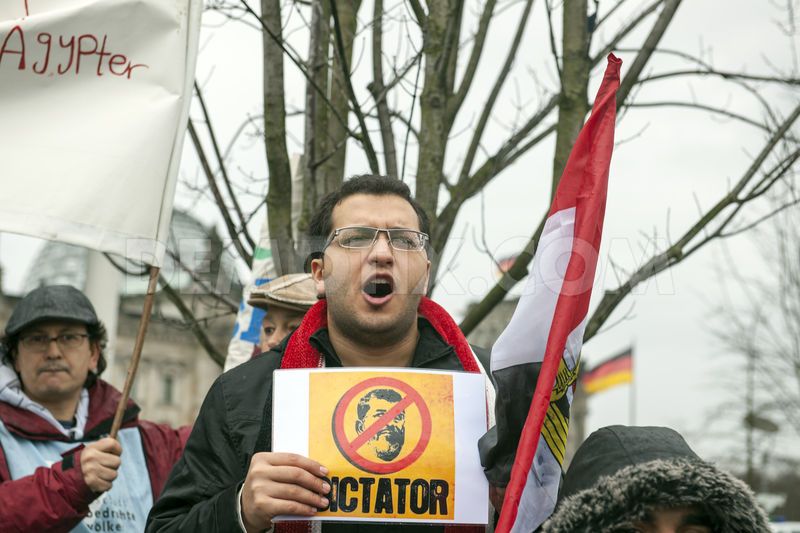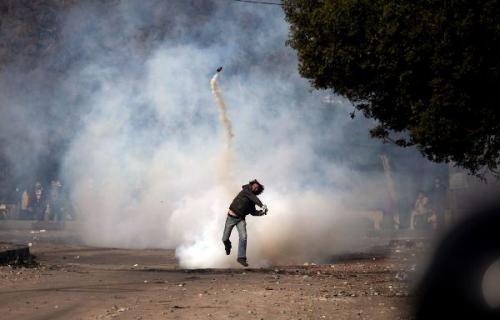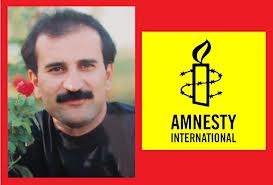Remarks by Lord Alton of Liverpool at a Memorial Service for Dr.Helmy Guirguis – Founder of the UK Copts – at the Royal Society of Medicine, London, 6.30 pm, March 3rd 2015.
In 1997, when I was raised to the Peerage as a Baron, and entered the House of Lords, one of my young children asked me “Dad, does it mean we get a castle?”.
No, but, I told him, that thanks to Her Majesty the Queen, Garter-King-of-Arms, would be talking to me about my right to a coat of arms.
What should go on a coat-of-arms, my son asked?
Symbols, and a motto which mean something to you and which connect with you, your family, and the beliefs which animate you. So, we talked about what these might be.
Ten years earlier, while a member of the House of Commons, I had been one of the founders of Jubilee Campaign – a charity which, among other things, campaigns for freedom of religion and belief – rights conferred under Article 18 of the 1948 Universal Declaration of Human Rights.
Jubilee had been founded in response to the murder, incarceration and egregious violations of the human rights of countless men and women in the former Soviet Union.
After the fall of the Berlin Wall Jubilee wanted to refocus its work and asked me to travel to Egypt and to publish a report into the discrimination experienced by Egypt’s Copts.
It was the visit which first opened my eyes to the wonderful story of this apostolic church, rooted in the earliest accounts of Christianity. I was privileged to visit St.Mark’s in Cairo and to meet the late Pope Shenouda III.
That visit opened my eyes to the suffering and persecution of the Copts and to the remarkable humanitarian work of men and women like Maggie Gobran, whom I wrote about oin my book Signs of Contradiction.
That visit led me to meet UK Copts – represented so well by Bishop Angaelos – and to my first encounter with the wonderful Dr.Helmy Guirguis. I have been proud to be associated with them ever since.
My only regret in travelling to the international Coptic Conference in Washington, last year, was that Helmy’s health made it impossible for him to be there with me.
So what has this to do with my son’s question?
When, in 1997, Garter-King-Of-Arms asked me what symbols I wished to incorporate into my coat-of-arms I told Helmy of my intention to include the Egyptian ankh cross.
The ankh is the Egyptian symbol of eternal life. Some say it represents the giving of life.
Although it has its origins in an antiquity which predates Christianity its symbolism at the heart of the new dispensation represented by the Holy One who came as a child to Egypt and was crucified at Golgotha.
Nailed to His cross is all our suffering, our sins, our mortal failings and our pain. It is the cross which gives life and truly represents eternal life.
Along with the ankh cross, for my coat of arms, I chose two words as my family motto. They are the words which were given to Moses; Choose Life. They were words which were at the heart of everything which Helmy did and for which he stood.
I am told that in ancient Egyptian mythology the ankh means that once the pharaohs, or, indeed, any other person dies, their heart is weighed on a scale against the feather of truth.
If the heart is heavier than the feather, it means that the person committed too many bad deeds in their life.
I have no doubt that when his heart is weighed on the scale of truth, and his work written into the Book of Life, Helmy’s heart will be lighter than a feather because in all that he did – as a doctor to his patients and as a physician to a sick society – he never abjured the truth. He understood to what suffering the failure to detect the symptoms of this malady would lead.
As a doctor – and, indeed, as a patient – Helmy knew a thing or two about the heart.
In his professional life he clung to the ancient duty of the physician – that if you cannot help you do not harm.
He also knew that the heart of the human problem is the human heart.
That is why he used his considerable talents to promote an alternative medicine to the hatred and sectarianism which seems to characterise life in much of the Middle East today.
He was an apostle of peace, respect, tolerance and co-existence. But he also knew that we had a duty to tell the truth and to stand up for those who are voiceless and powerless.
The consequences of ignoring the signs of disease have been seen most vividly, in the aftermath of Helmy’s death, in the shocking beheading of 21 Coptic Christians in Libya. They went to their deaths as martyrs, with the gentle name of Jesus on their lips.
The most fitting memorial to them; the most fitting memorial to Egypt’s Copts – who in an orgy of violence, reminiscent of Europe’s Kristallnacht, have seen their churches, homes and business desecrated and attacked; the most fitting memorial to members of the ancient churches being slain across the Middle East by ISIS and their fellow travellers; the most fitting memorial to a truly good man, will be for others, from the next generation, to be inspired by the work of Dr.Helmy Guirguis, and to now take up his mantle.
May he strengthen our resolve and deepen our own hearts. May he rest in peace.
http://www.justicemagazine.org/jm/index.php/read-the-magazine
Egypt’s Kristallnacht
David Alton
In November 1938, in an orgy of violence which would become known as Kristallnacht, Jewish synagogues, homes, hospitals, and schools were ransacked and pillaged. The sledgehammers and petrol left more than 1,000 synagogues burnt and over 7,000 Jewish shops and businesses in ruins. The streets were covered in shards of smashed glass from broken windows.
Compare the charred husk of the Fasanenstrasse Synagogue in Berlin, in 1938, with pictures of the blackened walls of Degla’s ruined Church of the Virgin Mary, taken recently in Egypt, and you will readily understand why August 2013 represented Egypt’s Kristallnacht.
Compare the terror of 1938 with the fear of Copts as members of their community have been left dead, others assaulted, and their 118th Pope, Tawadros II, who is now under protection having had death threats made against him.
In 1938 The Times commented that: “No foreign propagandist bent upon blackening Germany before the world could outdo the tale of burnings and beatings, of blackguardly assaults on defenseless and innocent people, which disgraced that country yesterday.”
In August 2013, in an almost identical vein, The Times reported how “Dozens of churches, homes and businesses have been set alight and looted in Egypt, forcing millions of Christians into hiding amid the worst bout of sectarian violence in the country’s modern history. Some Coptic Christian communities are being made to pay bribes as local Islamists exploit the turmoil by seeking to revive a seventh-century tax, called jizya, levied on non-Muslims.”
The Sunday Times described how in one village “First they daubed the Christians’ shops and homes with a red cross. Then the mob stormed the police station before turning its wrath on the church.”
More than 90 churches, monasteries and church buildings have been attacked across the country. The Times said there had been incitement, that Imams in the town of Fayoum reportedly urged supporters to go out and attack churches and Christians.
In Cairo, Franciscan nuns saw the cross over their school gate torn down and replaced by an al-Qaeda flag while the school was burnt down and three nuns were frog marched through the streets while mobs showered them with abuse. One nun said “They paraded us like prisoners of war.”
Joe Stork, acting Middle East Director at Human Rights Watch reported that “Dozens of churches are smouldering ruins, and Christians throughout the country are hiding in their homes, afraid for their very lives”
One of those who died was a young Christian deacon, Wahid Jacob, whose funeral was held last week. He had served the St.John the Baptist Church in Asyut until August 21st, when he was kidnapped. His captors demanded 1.2 million Egyptian pounds ($171,000) – an impossible ransom for his impoverished family. Their inability to pay up led to his execution. The priest who conducted Wahid’s funeral said that the young man’s body, found dumped in a field, was badly tortured. These unconscionable sectarian crimes follow years of indifference to the regular reports of the abduction and forced conversion and marriage of Christian girls; of accompanying violence and rape; discrimination, beatings and abuse.
Attacks on the Copts, who number around 10% of the 85 million Egyptian population have occurred throughout the country, and are well documented in Upper Egypt’s Minya, Assiut and Sohag; in Beni Suef in the Nile Delta; and in the governorates of Giza and Cairo. Although the Tamarod coalition which, on July 3rd, brought the removal of Mohammed Morsi and his Muslim Brotherhood Government had the support of millions of Egyptians – including secularists, intellectuals, students, women, moderate Muslims, and the army – it is the Coptic community who have borne the brunt of these revenge attacks.
The puritan-tendency in the Muslim Brotherhood have blamed Christians for the military coup and their media outlets have whipped up hate. The hatred is then recycled by key Muslim Brotherhood leaders in their speeches to their supporters. Happy for the Christian minority to be used as a scapegoat, the security forces have been largely indifferent to this suffering.
When it comes to the Copts the perpetrators enjoy impunity and can terrorise at leisure. The Economist reported that “nowhere had the police thought to reinforce security, and nowhere did they intervene promptly or with sufficient force.”
This combination of impunity, terror and blackmail prompts the question, where is the solidarity from Christians and non-Christians alike which such events demand? African slaves, abandoned to a life of exploitation, poignantly ask the same question in the words of the African-American Spiritual – “were you there when they crucified my Lord?”
In the aftermath of last week’s events – and well aware of the indifference which has been shown to the fate of Christians throughout the region – it’s the same question which Coptic Christians have been asking of those who have voices but who do not raise them; of those who have resources but who do not use them; and those who have freedom and power but fail to exercise it.
All of us ask should ask ourselves what we said and what we did when they burnt the churches, terrorised the people and killed the Copts. It took the outgoing British Chief Rabbi, Lord Sacks – always mindful of the events to which Kristallnacht led, to point to our indifference to the assault on the Copts which he described as “a tragedy going almost unremarked” and is the “religious equivalent of ethnic cleansing”.
Yet, not all consciences have been still and not all voices have been silent. At a protest outside the White House, in chants which echoed those used against Lyndon B. Johnson, in the context of Vietnam, critics of the Obama administration’s support of the Muslim Brotherhood demanded “Obama Obama don’t you care? Copts are dying over there”.
Recall that when Mubarak was removed from office President Obama said that “Egypt will never be the same.” Was the Egypt of the Muslim Brotherhood what he really had in mind? What is his red line for the Copts or, is it true that he has run out of red ink?
Too many in the U.S. who call themselves Progressive, or who can be counted amongst their cheer leaders in Britain, have characterised the Morsi Government and the Muslim Brotherhood as lawful and worthy of support and would have them return to power. The New Statesman says “Either Britain supports democracy abroad or it doesn’t”. The Egyptian military are painted as usurpers and illicit. Where here is any intelligent or truthful assessment – let alone moral indignation – of the tyranny and violence which has been part and parcel of the ideology promoted by the Muslim Brotherhhod and their fellow travellers?
This isn’t just about what passes for democracy. The holding of an election – like the one which ushered in the Third Reich after Kristallnacht – is not the only test of what makes for a democratic society. The rule of law is the first test and the protection of a country’s minorities and women, is the second.
The reality is that the Brotherhood was disastrously incompetent in Government and attempted to bring in a wholly undemocratic Constitution which would have denied vast swathes of the Egyptian population – especially its women and its minorities – their lawful rights. Does that make a country democratic? As Egypt descended into total anarchy was the army supposed to simply stand by and watch it happen?
Despite welcome signals from the new Government of redrawn Constitutional protections it is also reported that it will continue to provide Sharia as the “principal source of law” – and so a raft of civil rights, freedoms, including protection for minorities and equal opportunities for women, will have no guaranteed basis in law.
Egypt’s future can only be based on a secular Constitution where human rights, including the rights of minorities and the right to freedom of religion or belief (including the right not to believe), are respected.
Above all, Egypt’s future will depend on the rule of law. As Human Rights Watch has pointed out, there can be no peace or stability in Egypt if the authorities fail to intervene to prevent the attacks or to bring the perpetrators to justice, or if they ignore the violent rhetoric which whips up hatred. Over the past few years we have regularly pointed to the significant numbers of Copts who have been fleeing Egypt.
In a climate of fear and intimidation, coupled with historic and long-standing discrimination, this exodus is entirely understandable. But if this represents the only future for Copts it will be a tragedy for Egypt and for the Copts’ Muslim neighbours alike. An Egypt which is unable to accept difference and unwilling to promote tolerance will be an increasingly unbearable place for all of its other citizens.
That’s why Egypt’s Kristallnacht matters so much.
David Alton is a member of the British House of Lords and honorary President of UK Copts Association.
——————————————————————————————————–
Some earlier remarks in February 2103: Egypt’s Second Revolution?
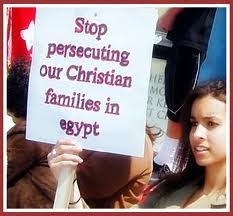
Egypt’s new Constitution discriminates against Christians, women, Shias, Buddhists, Bahais and secularists.
Having seen their ideals and dreams left lying amongst their abandoned banners thousands of demonstrators have returned to Cairo’s Tahrir Square, attempting to rekindle their dream of a modern Egypt and a tolerant democracy.
But many other factors are also in the dangerous mix and eruption of widespread violence and discontent – with sixty left dead over five days. A State of Emergency has been declared in several Egyptian cities with the chaos triggering disastrous economic consequences – a collapsing currency and confidence. Sweeping and draconian powers have been given to the police to detain citizens for up to 30 days without any judicial review and to hold trials before special courts.
Economic collapse is the last thing which Egypt needs. 87% of the Gross Domestic product is debt; 65% of the population cannot read or write; around half the population live on the poverty line; and 30% of young people are unemployed. If ever you wanted proof that the devil makes mischief for idle hands it can be seen on Egypt’s streets – and if ever there was a time for a government which understood economics and social justice this is surely that time.
Instead, with this melt down of Egyptian society we may well be on course for a military coup.
Offering a taste of the pretext which the army would give for seizing power, General Abdel Fattah al-Sissi, Chief Commander of the Egyptian Armed Forces and Defence Minister issued a dire warning that “Egypt is at risk of collapse”.
As the army, the Muslim Brotherhood, the security forces and the Opposition all reposition themselves, what has brought Egypt to the brink of civil war?
The key is the sense of betrayal felt by many Egyptians as they watch radical Islamic Salafists increasing their grip on President Mohammed Morsi’s Muslim Brotherhood government. Demonstrators have begun to refer to Morsi as “Morsilini” – a play on the name of Italy’s fascist dictator.
Their anger is particularly directed at Egypt’s new constitution which institutionalises discrimination against women, minorities and secularists. One of those who drafted it, Sheikh Yasser Borhamy proudly announced that the new constitution would usher in wholly unprecedented controls and “place restrictions on freedom of thought, expression and creativity.”
It is a paradox that the Mulsim Brotherhood is a strong and well organised movement but is a weak a wholly ineffectual government. Adding paradox upon paradox, it is Morsi who, having precipitated the cataclysmic fissures which have brought Egypt to this sorry pass, is now calling for dialogue.
And does he not have the eyes to see that all over the world vibrant, thriving, societies function and succeed precisely because of their diversity and tolerance not because of the suppression of freedom of thought, expression or creativity?
Bishop Kyrillos William, Administrator of the Coptic Catholic Patriarchate of Alexandria, says that the new constitution threatens human rights: “We were waiting for a constitution that represents the whole of Egypt, but instead we have one that only represents one group of people.”
Bishop William joined Bishop Joannes Zakaria of Luxor and Bishop Antonios Aziz Mina of Giza in warning against the constitution and voiced concern about its impact on women. It will force non-Muslim women to wear Islamic headscarves and allow women who are “sexually mature” to marry – a clause to legitimise the arranged marriages of young teenage girls. A young Coptic woman said :“I can no longer stand the insults and the spitting in my face because I don’t wear hijab. I have become a stranger in my own country.”
The new constitution implicitly allows child labour and Shiite Muslims, Baha’is, Buddhists and others are not even recognised as existing.
This further entrenches the unrecognised state of war which exists between Shia and Sunni Muslims and which is being played out across North Africa and the Middle East. If unchecked, that inter-Muslim war will manifest itself in Europe too.
Egypt and Iran represent those two opposing positions and Egypt is in real danger of becoming a mirror image of Iran.
The tightening of Sharia Law, the imposition of restrictions on the media and the judiciary and the curtailing of many civil liberties would put Egypt on course for Iranian style theocratic dictatorship. As in Iran, the radicals have begun an all out assault on secular values and on the Christian minority. Last week alone, Egypt’s ancient Coptic Christian community, who comprise around 10% of the population, saw three of its churches attacked and burnt and homes and shops destroyed.
Around 1,000 Islamists were reported to have attacked the predominantly Christian village of el-Marashda in Upper Egypt. The Christian families were ordered not to leave their homes – although, in a hopeful sign, the village Imam expressed his solidarity with the Christian community and called on Muslims to protect their Christian neighbours.
The West has been hopelessly indifferent to the plight of the minorities in the region and wide-eyed and naive in characterising the Arab Spring as a relentless march towards democracy and pluralism. Notwithstanding David Cameron’s remarks in Libya Last week, from Iraq to Syria, the Lebanon to the Gulf, the reality has been a horror story for the besieged Christian communities.
For years the west has turned a blind eye. It has sold arms and courted the dictators and regimes who govern countries like Iran and Saudi Arabia while showing complete indifference to their violations of human rights. In Syria, the UK is aiding and abetting groups who have targeted Christians – in one grotesque incident beheading a Christian man and feeding him to the dogs. Will this be an improvement on Assad?
And what is life like in those countries which are now ruled by Islamists?
Last week in Iran, the prosecutor for the mullahs’ regime in Sari announced the amputation of the fingers of a person charged with robbery. Two days earlier, in Shiraz, they publicly amputated the fingers of a 29 year old man. Ali Alghasi, Shiraz public prosecutor, called the amputations a “serious warning” to all who “cause insecurity”. He emphasized the importance of: “decisiveness and intolerance”. But amputations are only a part of the story in a country which specialises in crushing dissent and fomenting an atmosphere of fear.
Earlier in the week, State media reported that a 27 year old prisoner was publicly hanged in Kerman along with two prisoners in Ilam and Shahroud, one prisoner in Khorramdarreh and three prisoners in Qazvin – all of whom were executed.
As Egypt’s Morsilini tries to emulate Iran, and a second revolution unfolds, the West should be very wary of the company it keeps and not rush to legitimise regimes whose values are inimical to our own.
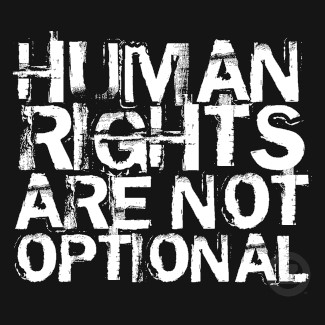
——————————————————————————————————–
Speech In The House of Lords – Tuesday October 29th
2013.Arab Spring
Question October 29th 2013
5.57 pm
Lord Alton of Liverpool (CB): My Lords, I thank the right reverend Prelate the Bishop of Wakefield for initiating this debate. I have a non-pecuniary interest as president of UK Copts. Indeed, my remarks will focus predominantly on the situation in Egypt, following on from what the noble Baroness, Lady Falkner of Margravine, has just said.
Before starting, I must say in parenthesis how much I agree with what the noble Lords, Lord Selkirk of Douglas and Lord Anderson, said about the importance of upholding Article 18 of the 1948 Universal Declaration of Human Rights. I commend to the Minister the excellent report of the All-Party Group on International Religious Freedom or Belief, of which I am an officer, entitled Article 18: An Orphaned Right, which sets out many of the arguments eloquently expressed today by the noble Lords.
Hostility and even violence against Christians is not new in Egypt, but the turmoil that followed the overthrow of President Mubarak and the subsequent removal of President Morsi has led to unprecedented violence. Just a few days ago, as the members of a community prepared to celebrate a wedding, they sorrowfully returned to their church to bury four of
29 Oct 2013 : Column GC584
the guests, including two little girls: Mariam Ashraf Seha, aged eight, and Mariam Nabeel, aged 12. They were shot dead as two men with automatic weapons opened fire on guests outside the Virgin Mary Church on the west bank of the Nile. Another 17 people were wounded. The most senior cleric at Al-Azhar University, the world’s primary seat of Sunni Islamic learning, described the killings as,
“a criminal act that runs contrary to religion and morals”.
These killings come in the wake of a summer of violence. Writing about the plight of the Copts and the other ancient churches of the Middle East, Professor Diarmaid MacCulloch, Professor of the History of the Church at the University of Oxford, recently wrote:
“It is easy for them to feel abandoned and betrayed by the Christian-based cultures of the West. When will this Western silence end?”.
In November 1938, in an orgy of violence that would become known as Kristallnacht, Jewish synagogues, homes, hospitals and schools were ransacked and pillaged. The sledgehammers and petrol left more than 1,000 synagogues burnt and more than 7,000 Jewish shops and businesses in ruins. The streets were covered in shards of smashed glass from broken windows. If noble Lords compare pictures of the charred husk of the Fasanenstrasse Synagogue in Berlin, in 1938, with those of the blackened walls of Degla’s ruined Virgin Mary church, taken two months ago in Egypt, they will readily understand why August 2013 represents Egypt’s Kristallnacht. One can also compare the terror of 1938 with the fear among Copts as members of their community have been left dead and others assaulted. Their 118th Pope, Tawadros II, is now under protection, having had death threats made against him.
In 1938, the Times commented:
Reports in the Times and Sunday Times in August 2013 are in an almost identical vein, with the latter paper referring to an event in Cairo where Franciscan nuns saw the cross over their school gate torn down and replaced by an al-Qaeda flag. The school was burnt down and three nuns were frog-marched through the streets while mobs showered them with abuse. One nun was reported as saying that,
“they paraded us like prisoners of war”.
Joe Stork, deputy director for the Middle East at Human Rights Watch, reported that,
“dozens of churches are smouldering ruins, and Christians throughout the country are hiding in their homes, afraid for their very lives”.
It took the outgoing British Chief Rabbi, the noble Lord, Lord Sacks—always mindful of the events to which Kristallnacht led—to point to our indifference to the assault on the Copts, which he described as a tragedy “going almost unremarked” and as,
“the religious equivalent of ethnic cleansing”.
That is why Egypt now needs a constitution, an issue being considered as we meet, that protects minorities, women—as mentioned by the noble Baroness, Lady Falkner, a few moments ago—and secular groups. It is easy to get into denunciatory mode about the role of armies, but as Egypt saw attempts to impose a theocratic
29 Oct 2013 : Column GC585
state, and the country descended into total anarchy, were those who love their country supposed to simply stand by and watch it happen? Egypt’s future can only be based on a secular constitution where human rights include the rights of women and of minorities and the rights of religion and belief—including the right not to believe—and where all those things are respected.
The 50-member committee tasked with amending the suspended 2012 constitution has, according to the Ahram news website this week, initially adopted an article 47 which stipulates “absolute freedom” of belief for Egyptian citizens and endows the state with the responsibility to ensure free practice of religion. It also adopted a transitional article that will cancel existing restrictions regulating the building of new churches. All this is very welcome, although there is pressure to restrict this to the three monotheistic beliefs, which would exclude Baha’is, for instance. I hope that that will be resisted and will be interested to hear from the Minister whether we have raised that issue directly with the Egyptian authorities.
In a climate of fear and intimidation, coupled with historic and long-standing discrimination, the significant exodus of Copts from Egypt that is now under way is entirely understandable. However, if this represents the only future for Copts it will be a tragedy for Egypt and for the Copts’ Muslim neighbours alike. An Egypt which is unable to accept difference and unwilling to promote tolerance will be an increasingly unbearable place for all of its citizens. That is why Egypt’s Kristallnacht matters so much.
6.03 pm
http://www.copts.co.uk/articles/5852-arab-spring.html

